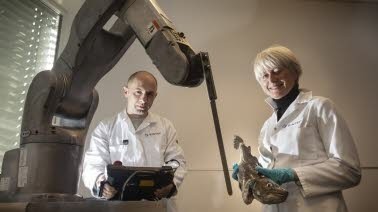Food innovation center receives honors

The Flavor Research and Education Center, which is led by professors Devin Peterson and gary Reineccius, was founded to help develop a science-based understanding of food flavor and related chemistry. Its focus is on flavour generation, characterization of flavor compounds, and flavor delivery in foodstuffs.
Food research
Work at the Center includes investigating mechanisms of flavor development of whole-grain foods, including both taste and aroma-actives; the goal is to better understand the influence of whole-grain composition on flavor development, to support production of flavorful, healthful foods. The Center shares research with 19 member food brands and processing firms, including PepsiCo, Nestle and General Mills.
According to Peterson, the Center’s work focuses on technologies that benefit the entire industry.
"The Center is an open innovation platform," said Peterson. "In food flavor research, a lot of work is sponsored by industry via one-on-one relationships. The Center allows us to spread the cost of research across many different companies enabling the development of knowledge that would not be done otherwise. Our goal is to bring companies together to work on common problems, and provide a basic understanding of those problems, so that they can take that information internally and use it to their own competitive advantage."
Flavor and technology
The Center was honored by the Waters Corp. because their research staff uses Waters liquid chromatography and mass spectrometry instruments in its work. Peterson said such equipment helps the organization increase understanding of complex issues around food and flavor.
“For most of the last 30 or 40 years, we focused on aroma because aroma was considered the main aspect of flavor, in part because bench-top GC mass spectrometers enabled us to understand that dimension," he said. “As technology has evolved, so has our understanding of taste and how we perceive flavor. Today taste and aroma are both considered essential to understand a flavor perception. Liquid chromatography (LC) and mass spectrometry (MS) technology has played a critical role in helping us understand flavor, from the characterization of taste compounds to mapping the pathways of flavor development.”
Dr. Paul Young, senior director of food and environment business operations for Waters, said the Center was honored because its staff is working to take food research to a new level.







